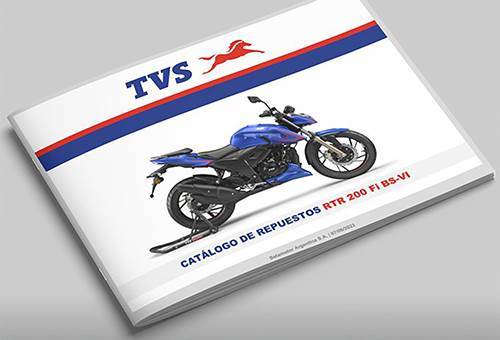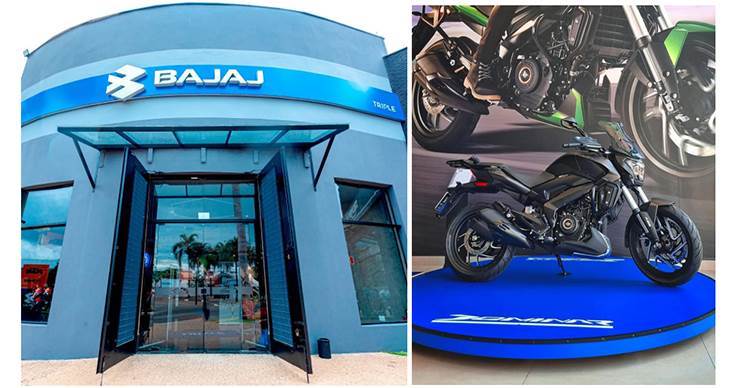Indian two-wheeler manufacturers like Bajaj Auto, Royal Enfield, TVS Motor Co and Hero MotoCorp are fast increasing their global manufacturing footprint as a strategic move to target specific growth markets, which will also act a buffer to inclement market conditions in other regions.
With two-wheeler exports in some key African markets coming under pressure once again in recent months and impacting the export growth curve, Indian two-wheeler OEMs are looking to diversify into other global markets and Brazil and South America / Latin America make for a promising business opportunity where demand remains strong.
Brazil, Mexico and Argentina are the largest economies in the region. Brazil though stands out by being the largest in the region, is the world’s fifth largest country and home to over 210 million people. To briefly put it, Brazil is fast rising in importance in the global scheme of things for Indian motorcycle and scooter manufacturers.
 Bajaj Auto currently produces the Dominar E27.5 motorcycle which uses a 27.5% ethanol-gasoline blend in the Brazilian market.
Bajaj Auto currently produces the Dominar E27.5 motorcycle which uses a 27.5% ethanol-gasoline blend in the Brazilian market.
Bajaj Auto bets big on Brazil
On October 18, Bajaj Brazil (Bajaj Do Brasil Comercio De Motocicletas), Bajaj Auto’s wholly owned subsidiary, announced plans to invest additional capital of up to US$ 10 million (Rs 84 crore) in a phased manner for business expansion and the needs of the growing business. In June 2024, Bajaj Brazil commenced operations at its new plant in Manaus, Brazil. The plant, which currently produces the Dominar motorcycle, has a single-shift capacity of 20,000 units per annum, scalable in the future to 50,000 units.
Bajaj Auto has the Dominar E27.5 variant which uses a 27.5% ethanol-gasoline blend in the Brazilian market. The company has also developed the Pulsar NS160 Flex, which runs on both ethanol and gasoline (petrol). This could likely be the next product for rollout in the Brazilian market. In September 2024, at the India Bio-Energy & Tech Expo, Bajaj Auto had showcased the E100 Pulsar NS160, a flex-fuel bike which can run on 100% ethanol and also on a mix of petrol and ethanol in different ratios.
Royal Enfield: first to open a plant in Brazil
Brazil is also a key market for Royal Enfield since the brand’s foray there in 2017. Having made significant strides in the country and across the entire Americas region, Royal Enfield is amongst the top five players in the midsize motorcycle segment in markets such as Brazil, Argentina, Colombia, Mexico and North America.
 B Govindarajan, CEO, Royal Enfield, at the inauguration of the CKD plant in Brazil in December 2022.
B Govindarajan, CEO, Royal Enfield, at the inauguration of the CKD plant in Brazil in December 2022.
On December 7, 2022, Royal Enfield inaugurated its CKD assembly plant in Manaus, capital of Amazonas state, making the facility its fourth assembly unit across the world after Thailand, Colombia and Argentina. RE has, more recently, opened a fifth CKD plant in Nepal, in addition to its state-of-the-art manufacturing and ancillary facilities located in India.
With an assembly capacity of more than 15,000 units per year, RE’s local assembly unit in Manaus is a state-of-the-art, modern facility designed to cater to growing demand in Brazil and Latin America. The Brazilian plant locally assembles the entire RE line-up including the new Classic 350, Meteor 350, Himalayan, and the 650 twins, Continental GT and Interceptor.
TVS bullish on Latin America
TVS Motor Co, which market its motorcycles and scooters in Brazil through an international sales operation, currently has four manufacturing plants – three located in India (Hosur in Tamil Nadu, Mysore in Karnataka and Nalagarh in Himachal Pradesh) and one in Indonesia (at Karawang).

The company, which is India’s second largest two-wheeler exporter after Bajaj and dispatched over half-a-million two-wheelers in H1 FY2025, also views Latin America as a key growth market. In an August 12, 2024 conference call, K N Radhakrishnan, CEO, TVS Motor Co, had said: “LATAM gives us a huge opportunity. We have started exporting to LATAM, we have started doing better than the industry. We will start investments in LATAM and we’ll start build(ing) it.”
Hero MotoCorp to foray into Brazil soon
Hero MotoCorp, the world’s largest two-wheeler manufacturer and the domestic market leader, is upping the ante on its global manufacturing footprint. The company, which entered the growing Southeast Asian market by commencing operations in the Philippines on August 1, 2024, plans to now bring Brazil into its ambit.
In an investor presentation in July, Hero MotoCorp confirmed that operations will start in Brazil in Q4 FY2024 (January-March 2025). In May this year, the company had said it had plans to set up a new wholly owned subsidiary in Brazil, to manufacture and distribute two-wheelers, including parts and accessories. The Brazilian operations is most likely to be named ‘Hero MotoCorp do Brasil Ltd’, with investment in phases. The products for Brazil will likely use E27, which is a blend of 27% ethanol with petrol.
The company is witnessing growing export demand – the 114,168 units in April-September 2024 represent a 30% YoY increase and comprises 99,174 motorcycles (up 40%) and 14,994 scooters (down 14%). The company now has four overseas assembly plants – in Bangladesh (150,000 units per annum), Colombia (80,000 per annum), Nepal (75,000 units per annum) and the Philippines (150,000 units per annum). The Brazilian assembly facility will be the fifth.
Why Brazil?
Indian two-wheeler OEMs’ bullishness on Brazil is understandable. According to market research firm IMARC Group, the Brazilian two-wheeler market size was valued at US $2.34 billion in CY2024. This is expected to reach US $ 3.39 billion by CY2032, with a compounded annual growth rate (CAGR) of 3.60% between 2024 and 2032.
The two-wheeler market in this key South and Latin American market is currently witnessing a surge in e-commerce and last-mile deliveries, availability of affordable financing options, supportive governmental policies and incentives, and a growing push for eco-friendly alternatives. Rapid urbanisation is also accelerating demand for two-wheeler purchase in the form of two-wheeler rentals and sharing services.
There’s another reason. Brazil, which is among the countries deploying ethanol as an eco-friendly transportation fuel, is the world’s largest producer of not only sugar but also bioethanol made from sugarcane. Sugarcane absorbs CO2 from the air as it grows through photosynthesis and the ethanol it helps produce is an environmentally friendly biofuel that doesn’t increase atmospheric carbon when burned. Furthermore, it is considerably cheaper than petrol.
Leading Indian two-wheeler makers including Bajaj Auto, Hero MotoCorp and TVS Motor Co have developed flex-fuel motorcycles which use ethanol and would find a ready market in Brazil.
